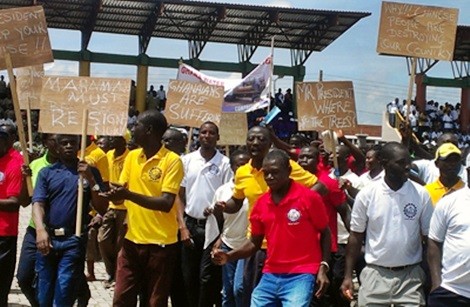 ANGRY WORKERS at this year’s May Day celebration stormed the Jubilee Park in Kumasi, holding different placards some of which had harsh inscriptions calling on President John Dramani Mahama to step down.
ANGRY WORKERS at this year’s May Day celebration stormed the Jubilee Park in Kumasi, holding different placards some of which had harsh inscriptions calling on President John Dramani Mahama to step down.
Some of the inscriptions read: ‘President Mahama Must Resign,’ ‘Stop Laziness And Be Serious,’ and ‘Better Ghana Has failed.’ The workers boldly marched through the parade grounds displaying their placards; clearly insinuating that they were not happy about the economic situation in the country.
In unison, the workers sang war songs as they moved about the event grounds. In attendance were the Ashanti Regional Minister, Samuel Sarpong and his deputy, Samuel Yaw Adusei.
In his address, Clement Kabba, Ashanti Regional Secretary of the Trades Union Congress (TUC), stressed that “times are hard” – referring to the austere economic situation in the country.
“The very harsh measures that have been implemented recently including increased VAT, increases in utility tariffs and fuel prices, and the exchange controls, are themselves enough pointers to the harsh realities that face Ghanaians.”
He emphasized that “times are hard and getting harder for the ordinary Ghanaians,” adding that the country’s economy is not in the best of form.
Mr. Kabba expressed worry about government officials and party communicators who often take to the cleaners, people who offer constructive criticisms to government about how to manage the economy.
“It will certainly not be helpful if government officials and commentators adopt hawkish posture and descend on people and institutions that express their views and offer suggestions on the way forward for our dear country.”
Mr. Kabba sternly cautioned the government not to sign the Economic Partnership Agreement (EPA) in its current form, noting that “it is dangerous for the country to kowtow to IMF bailout.”
He announced that government had agreed to negotiate salary increases for 2014. “After very intense consultations, discussions and negotiations in the last three days, the social partners have come to the understanding that workers should be adequately cushioned from the harsh economic realities we are currently facing in the country,” he disclosed.
The Ashanti Regional Minister, Samuel Sarpong, commended the media and civil organizations for exposing corrupt practices, indicating that government was ready to eliminate corruption to ensure Ghana’s growth.
He admitted that the country was facing harsh economic conditions currently but pointed out that the government was ready and willing to implement programmes to revive the economy and ensure better living for the people.
Mr. Sarpong said government was committed to improving education, health and making life bearable for the people, adding that it would consider the views of all stakeholders before taking a decision on the Economic Partnership Agreement.
Leadership Failure
Secretary-General of the TUC, Kofi Asamoah, at a similar function in Accra, said President Mahama should provide leadership and take the people out of the precarious poverty situation.
“We need you to lead us from poverty to prosperity,” he said at the May Day rally at the Independence Square.
Mr. Asamoah said although workers were celebrating May Day, they were suffering.
“The economy is not working for majority of Ghanaians. What we need is good leadership”, Mr Asamoah stated.
Mahama’s Admission
President John Mahama conceded that indeed times are hard, assuring that things are going to improve by the end of the year.
He said even though some of government’s measures introduced to revive the economy are harsh, “I assure you my countrymen and women, that these measures are achieving the desired effect and the economy is gradually responding.
“This year is a turn-around year for Ghana and I am positive that the Ghanaian economy will show strong signs of recovery by the end of this fiscal year.”
Many analysts believe the Ghanaian economy has suffered major dislocations with the local currency suffering a record loss in value in the first quarter of this year.
Inflation has inched up and the debt-to-GDP ratio is said to have crossed the critical 60 per cent mark.